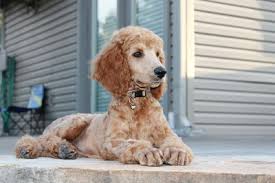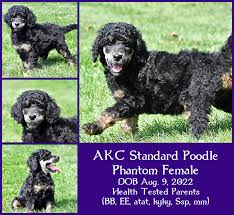What Does a Merle Poodle Look Like Merle Poodles are one of the variants that have increasingly gained popularity among the Poodle breed due to its distinctive and attractive coat pattern. Here is a detailed guide answering the most asked questions regarding the appearance, characteristics, and care of Merle Poodles.

1. What is a Merle Poodle?
1.1 Definition
A Merle Poodle is a Poodle that carries the coat pattern known as merle. Merle is characterized by a marbled or mottled effect on the fur, which can include patches of lighter colors with darker tones as well. This gives it a very attractive appearance. Though not officially recognized by major kennel clubs, the popularity of the merle pattern has grown very much among dog fanciers.
1.2 Coat Colors
Merle Poodles can appear in a wide range of color mixes including:
- Blue Merle: A gray-colored base with black patches.
- Chocolate Merle: A rich brown-colored base with lighter brown or tan patches.
- Red Merle: A reddish-colored base with cream or white patches.
- Black Merle: A black-colored base with lighter patches of gray or silver.
2. Characteristics of Merle Poodles
2.1 Size Variations
There are three standard sizes of Poodles: Standard, Miniature, and Toy. While each size can express the merle pattern, their overall dimensions will vary:
- Standard Poodle: Normally weighs 40-70 pounds and stands over 15 inches tall.
- Miniature Poodle: Usually weighs 10-15 pounds and stands 10-15 inches tall.
- Toy Poodle: Weighs 4-6 pounds and stands about 10 inches tall.
2.2 Body Structure
Merle Poodles have the same graceful body type as all Poodles with the following features:
Well-Proportioned Frame: Neither stocky nor slender body.
Long Neck: Elongated neck, and heads set on it, which are well-refined.
Straight Legs: Straight, strong, and straight with well-defined joints.
2.3 Coat Texture
A Merle Poodle generally has a tightly curly and dense coat, similar to most other Poodles. This characteristic is highly hypoallergenic, which makes Poodles a popular breed for people with allergies.
3. Distinctive Characteristics of Merle Poodles
3.1 Eye Color
One of the primary characteristics that people note about Merle Poodles is their eyes. They can have:
- Blue Eyes: Quite typical in merle-patterned dogs.
- Parti-Colored Eyes: Could even have one blue eye and one brown or hazel eye.
- Dark Eyes: Standard brown or black eyes are also possible, depending upon the overall coat color.

3.2 Nose and Paw Pads
The nose and paw pads of Merle Poodles are usually identical with their coat color. For example:
- Black Merle: Could have a black or dark nose and pads.
- Chocolate Merle: Typically has a brown nose and pads.
- Blue Merle: Often develops a dark gray or black nose.
4. Grooming and Maintenance
4.1 Coat Care
Grooming a Merle Poodle requires regular maintenance to avoid matting and keep it in its best condition. Some of the necessary grooming that needs to be done are:
Brushing: A Merle Poodle should be brushed regularly, ideally at least 2-3 times every week to remove tangles and loose hair.
- Professional Grooming: Schedule a professional grooming session every 4-6 weeks, for example, to help keep the coat in its best shape.
Bathing: Only on a when needed. It happens every few months or when the dog really gets dirty.
4.2 Skin Health
Merle Poodles should be checked regularly for skin irritations or other changes in the texture of their skin as they can suffer from some skin conditions. Hypoallergenic shampoos should be used during bath time to ensure that the skin stays healthy.
5. Health Considerations
5.1 Genetic Health Risks
Merle Poodles are prone to carrying certain genetic health problems, especially if both parents are carriers of the merle gene. Among these are:
- Deafness: Double merle dogs-inherit from two merle parents-are at a higher risk for having problems with hearing.
- Eye Disease: Various diseases, such as progressive retinal atrophy (PRA), may be more common in merle-patterned Poodles.
- Skin Disease: Some merle Poodles are born with increased sensitivity in their skin, which requires special care.
5.2 Good Breeding Practices
Avoid or minimize the health risks inherent with the merle pattern by selecting a responsible breeder who will not only guarantee your puppy is health-tested before breeding but also implements responsible breeding. Both parent dogs must have health clearances.
6. Training and Behavior
6.1 Temperament
Temperament of Merle Poodles is similar to that of other Poodles. They are highly intelligent and trainable. Key behavioral characteristics include:
- Desire to Please: They usually respond well to commands and training.
- Playfulness: Merle Poodles are playful and mentally stimulating, thus helping prevent boredom and associated behavioral problems.
6.2 Socialization
Merle Poodles need early socialization to ensure that they grow up as well-adjusted adults. Bringing them across various people, pets, and environments will build their confidence more.
7. Common Misconceptions
7.1 Merle Pattern Quality
Some individuals might look down on merle Poodles, thinking they are lower in quality because of the non-standard coat pattern. However, so long as they are bred responsibly, a merle Poodle can be just as healthy and loving a companion as any other Poodle.
7.2 Fragility of Small Breeds
Another misconception about Poodles is their fragility, particularly for Toy and Miniature types. Though they may be smaller, they can actually be pretty robust and energetic. Proper training and care will help minimize the risks associated with a small size.
8. Life with a Merle Poodle
8.1 Space Requirements
Merle Poodles, especially the Toy and Miniature varieties, are relatively well-suited for small living spaces or apartments. They need space to exercise but do not necessarily require a spacious yard.
8.2 Compatibility with Other Pets
Merle Poodles can be compatible with other pets if socialized early in life. These dogs grow to be tolerant of other animals if they are exposed to each other when still young.
9. Getting a Merle Poodle
9.1 Adoption vs. Purchase
If you’re interested in a Merle Poodle, consider both adoption and purchasing from a breeder. Rescues occasionally have Poodles of all colors, including merle.
9.2 Reputable Breeders
When seeking a merle Poodle, look for reputable breeders who conduct health testing and prioritize the well-being of their dogs. They should provide documentation of health screenings and be willing to answer questions about their breeding practices.
10. Conclusion
Merle Poodles are an attractive and affectionate breed, making them the best companions. Their unique coat patterns and vibrant personalities set them apart as a favorite dog breed among many dog lovers. Understanding appearance, grooming requirements, health issues, and training needs are all imperative factors in setting up a loving and nurturing home for these pets.
Whether you’re considering adding a Merle Poodle to your family or are simply fascinated by this captivating breed, their intelligence, playfulness, and unique beauty make them a joy to own. With the right care and attention, a Merle Poodle can be a loyal and loving addition to your household for many years to come.

